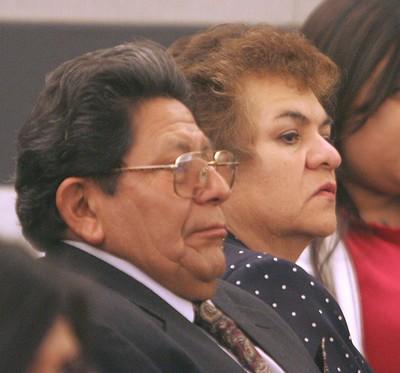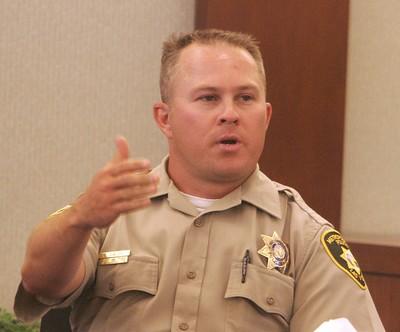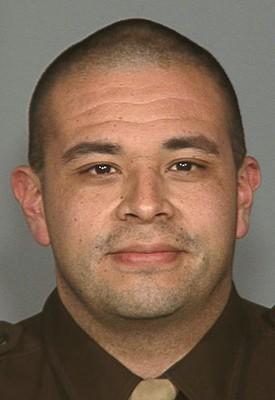Recruit’s death ruled suicide



In a monotone hinting of too little sleep and too much grief, Blanca Alonzo stood outside a Las Vegas courtroom Friday morning and said she hoped a coroner’s inquest would reveal truths that would set her free of questions about the February death of her son.
Why, she wanted to know, would her 29-year-old Ivan, whose dream of becoming a police officer was closer to being realized after he became a Metropolitan Police Department recruit, try to target police near the Strip both with Molotov cocktails and gunfire?
And why would "a good Christian boy raised as a Catholic" then kill himself?
"We just don’t understand," she said, motioning to her husband, Gerardo, and other members of her family. "It’s just so strange. My son was well-respected. We all think this is just so strange. Don’t you think so? We’d like some answers."
The answers she sought at the three-hour proceeding never came. Facts about her son’s death, elicited largely through questions from Chief Deputy District Attorneys Susan Krisko and Christopher Laurent, did.
A jury concluded just what the Clark County coroner’s office ruled in March: that Ivan Alonzo’s death on Feb. 9 at 9 p.m. was a suicide.
Alonzo had left a message with a police sergeant the morning of the incident saying he was resigning. Officers called him back several times that day but were unable to get in touch with him.
He was one day shy of completing a two-week pre-academy course that gives recruits an idea of what to expect during the academy.
"He never called me to say he was depressed," Blanca Alonzo said.
During his testimony, county forensic pathologist Dr. Lary Simms said Alonzo, who was 6 foot 1 and 299 pounds, was hit three times by bullets. One shot, to the leg, came from police.
The bullet wounds, Simms said, showed that Alonzo had shot himself twice in the abdomen and once in the right side of the head. The head shot, Simms said, was fatal.
He said toxicology tests showed that Alonzo, who worked for six years as a corrections officer in California, had no trace of drugs or alcohol in his system.
"I really haven’t learned anything more," Blanca Alonzo said after the jury made its ruling of suicide. "I’m so tired. We got into Las Vegas from Riverside (California) at one this morning, and I hoped we’d learn more. But all I know now is just a little bit more of where it took place. I’m not sure what to do now."
Ivan Alonzo had checked into the Hooters Hotel the day of the shooting. In the room, investigators discovered materials used to make Molotov cocktails, some .45 caliber ammunition, a box for one of the pistols he used during the incident and his recruit uniforms.
Testimony by Las Vegas police bicycle officers Brad Janecek and Michael Fairweather revealed how police became involved with Alonzo. According to Fairweather, he and Janecek were near the MGM Grand when paramedics reported seeing a man in a pickup brandishing a weapon.
Fairweather and Janecek testified that soon after a five-minute bike trip, they arrived in an area not too far from the Oasis Apartments. There, they saw Alonzo throwing Molotov cocktails, fuel-filled bottles that are lit and tossed and explode on contact. When Alonzo saw the officers, he tossed Molotov cocktails at them, Fairweather said.
Then, he said, Alonzo began firing two pistols into the air, causing both officers to dive for cover. Janecek said he ordered Alonzo to "stop and drop the guns."
Instead, Alonzo fired at the officers. Janecek fired back.
Police Detective Teresa Kyger said Janecek fired 16 shots and Alonzo fired 20 shots.
"The whole thing took only about 60 seconds," said Janecek, who had four shots nearly hit him, according to Kyger.
Janecek was flat on his belly when the shooting stopped. Neither he nor Fairweather saw Alonzo shoot himself. They found one handgun still in Alonzo’s hand and another on the ground. Alonzo’s T-shirt read "LVMPD," the initials for the police department.
Oasis Apartments resident Katie Jay said police acted appropriately. She, too, never saw Alonzo shoot himself.
Kyger said her investigation never revealed why Alonzo acted as he did.
One juror and hearing master Robert Lucherini wanted to know whether Alonzo’s weight made it difficult for him to become a police officer.
Though it might be difficult, Kyger said, it has been done by other heavy recruits.
No suicide note was found.
"You never know why some people snap," Laurent, the deputy district attorney, said as the jury deliberated. "It’s not unusual not to have a suicide note."
Samantha Charles, an information officer for the coroner’s office, said she wished the proceeding could have given the Alonzo family more peace.
"Unfortunately, a coroner’s inquest is not designed to get to the motivation for why someone might do something like this," she said.
As the proceeding wore on, Blanca Alonzo slumped in her seat. Her husband stared at the floor. "I can’t talk about this," he said.
Another family member helped Blanca Alonzo from the courtroom.
"Maybe when I get home," Blanca Alonzo said, "I will somehow make sense of this."












